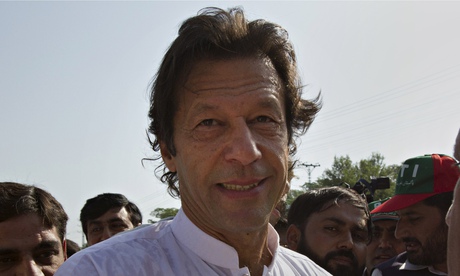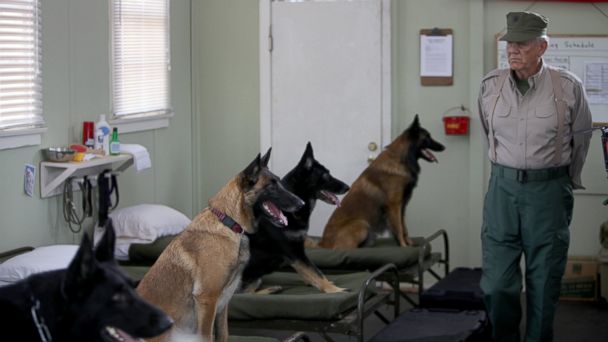
Pakistani politician and former cricketer Imran Khan is an alumnus of the elite Aitchison College in Lahore. Photograph: Nya,/AP
Traditions die hard at Aitchison College, a Raj-era school in the heart of Lahore that has been educating Pakistan's elite amid manicured playing fields and Mughal-esque buildings for decades. Students still wear starched turbans on formal occasions, tent-pegging is a competitive sport and important guests tour the 200-acre campus in a horse-drawn buggy.
So the surprise announcement by the school's governors that they would no longer favour the sons of alumni in the annual fight for places has sparked howls of indignation from high-powered old boys who say selecting on merit alone will damage the character of an institution that is a byword for social elitism in Pakistan.
The scrapping of the "kinship" rules, which took account of whether a father or grandfather of a would-be pupil once attended the school, was pushed through last month in a unanimous decision by board members.
Chaudhry Muhammad Sarwar, a former Labour MP who as governor of Pakistan's Punjab province also chairs the school board, said kinship had been used as an excuse to favour a tiny minority of "V-VIP" families.
"It was nothing to do with kinship but favouritism," said Sarwar. "When they talk about kinship they are not talking about kinship for the middle classes, they are talking about kinship only for a maximum of one dozen families."
The school has long been dogged by claims that coveted places have been handed out as favours to powerful political families, many of whom have attended the school for generations.
One former school leader said a parent once tried to use a political donation to a flood relief fund to ensure his son was made a prefect in the prep school.
Sarwar has been criticised for interfering halfway through the admissions process. He insists the change was strongly supported by Shahbaz Sharif, the powerful Punjab chief minister and younger brother of the prime minister.
But it caused uproar among old boys, particularly after the school posted a public notice saying only 75 of the more than 450 six-year-olds who had applied had scored more than 50% in entrance test. Although many of those who fell below that mark were later included to fill the 120 available places, the controversy has not died down.
Sarwar insisted the children from powerful families got marks far below the pass rate and would not have benefited from kinship considerations, which the school claimed only ever carried limited weight.
"It is very unfortunate that the children of notables didn't succeed, but they should feel happy merit prevailed and people from [the] middle classes have taken admission," he said. "They are upset because they feel they have some right to a place, but we are living in the 21st century."
Alumni have argued that kinship helps to ensure Aitchison continues to produce all-rounders as well as sustaining loyalty to an institution that has educated scores of famous politicians, including Imran Khan, the former cricket star.
Khawaja Tariq Rahim, another distinguished alumnus who once served as governor of the Punjab, said the system simply emulated the famous British public schools on which Aitchison was originally modelled.
"The governor has no idea about public school life," he said. "His whole politics are from his union activities, which he picked up as a member of the Labour party in the UK."
Most public schools in the UK are now educationally selective. The Headmasters' & Headmistresses' Conference, a body of elite UK private schools, said it was not aware of any of its members offering places based on family members being former pupils.
Although Aitchison faces growing competition from high-performing chains of private schools, it still commands fierce loyalty among students, one of whom last year praised the school for producing "perfect gentlemen".
"An Aitchisonian exudes a well cultivated air of confidence without appearing conceited," one A-level student wrote in an article for a national newspaper. "This is combined with unassuming intelligence and a sense of purpose."
The school, established in 1886 to educate the sons of princes, today boasts lavish facilities, including swimming pools and boarding houses.
While nationwide half of school-age Pakistanis are not in any form of education, Aitchison teaches in English and many of its 2,700 students go on to study at top foreign universities.
Some old boys say they are considering taking the matter to court.
"The problem is they think it's like a British club and they have a natural right for their sons to be invited to become members," said Fakir Aijazuddin, who said he tried to introduce merit-only selection during a short-lived and controversial period as the school principal, during which Aitchison was accused of giving away places to well connected families.
"But it doesn't belong to them, they only went there."

 RSS Feed
RSS Feed Twitter
Twitter














.jpg)

.jpg)



.jpg)
(2).jpg)
 VIEW GALLERY
VIEW GALLERY 




